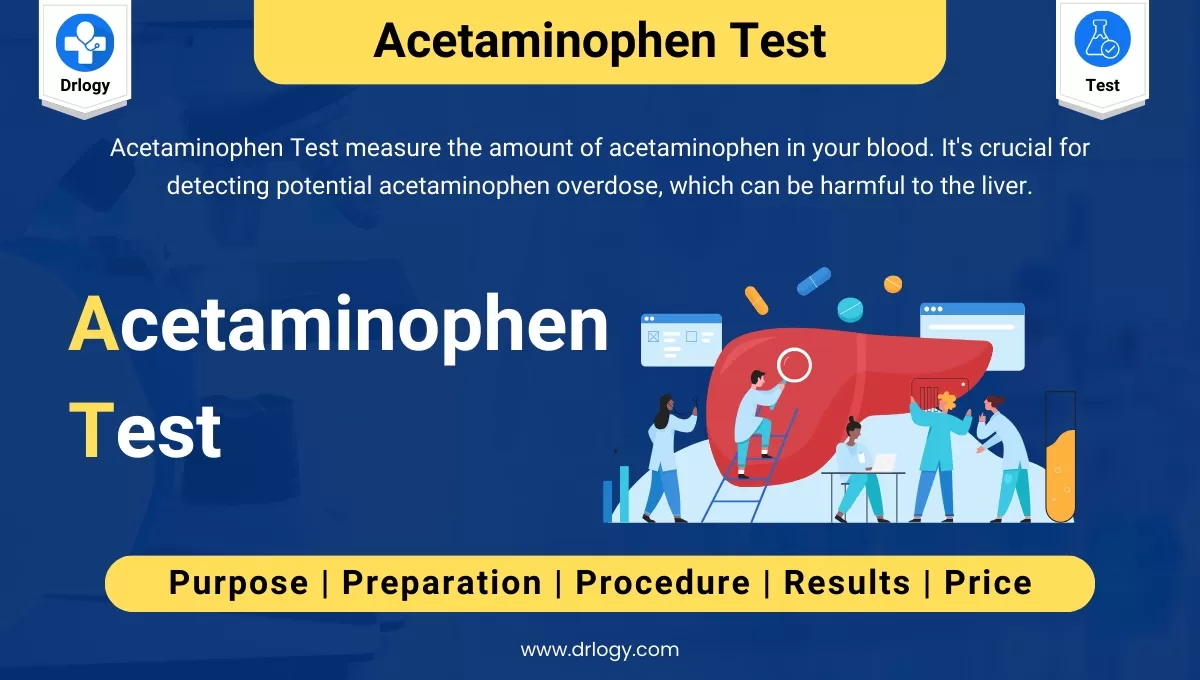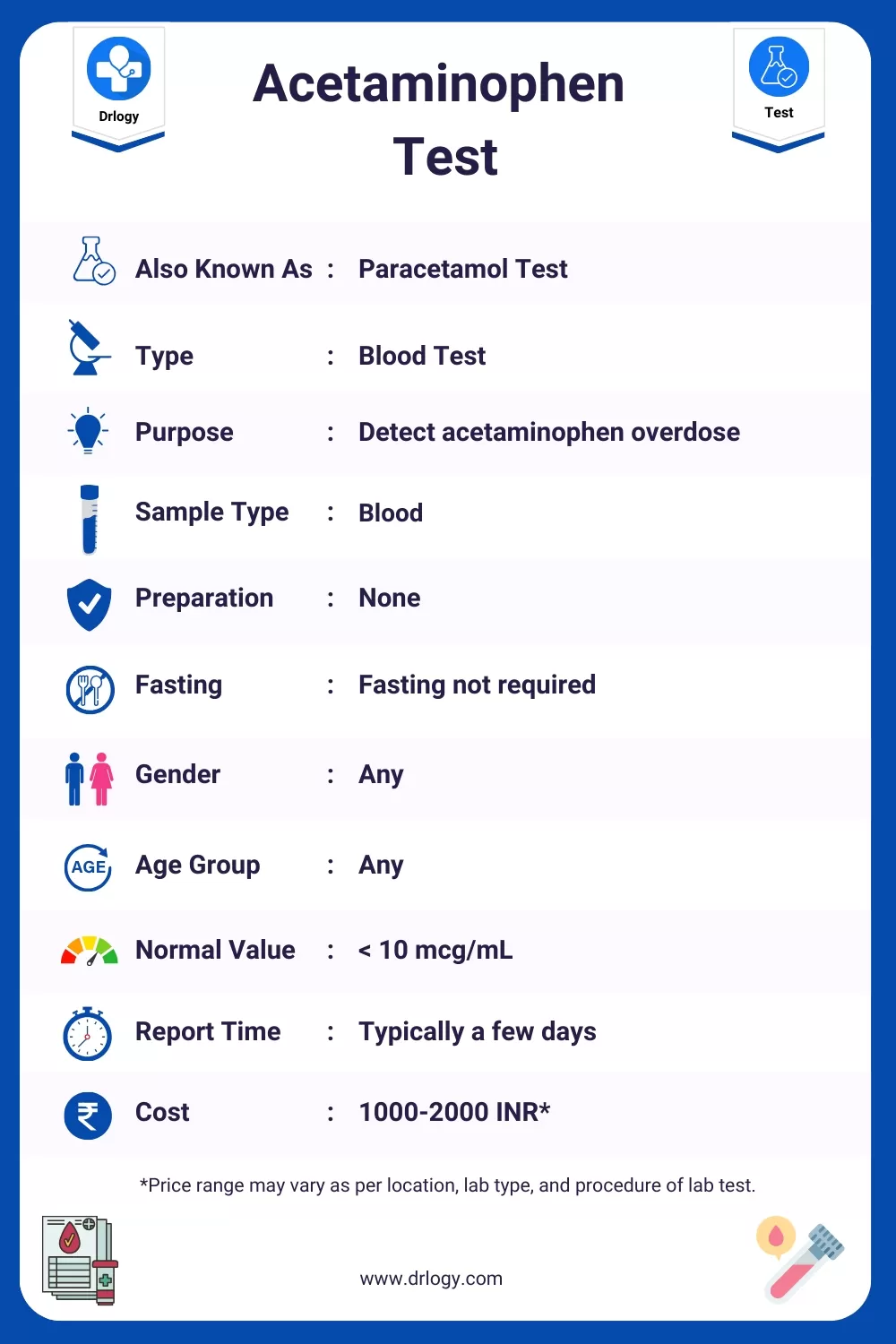
Acetaminophen Test To Detect Acetaminophen Overdose
Acetaminophen Test is a medical examination used to measure the amount of acetaminophen (commonly known as paracetamol) in your blood. It's crucial for detecting potential acetaminophen overdose, which can be harmful to the liver. This test helps healthcare professionals determine if the medication has been taken in excessive amounts.
Acetaminophen Test
Here are the basic details of the Acetaminophen Test.
| Also Known As | Paracetamol Test |
| Type | Blood Test for Acetaminophen Levels |
| Purpose | Detect acetaminophen overdose |
| Sample Type | Blood |
| Preparation | None |
| Fasting | Fasting not required |
| Gender | Any |
| Age Group | Any |
| Normal Value | < 10 mcg/mL |
| Reporting Time | Typically a few days |
| Cost | 1000-2000 INR* |
*Acetaminophen Test Price range may vary as per location, lab type, and procedure of lab test.
Acetaminophen Test Means
The Acetaminophen Test measures the concentration of acetaminophen (also known as paracetamol) in the blood.
- Acetaminophen is a common over-the-counter pain reliever and fever reducer.
- This test is used to detect and assess potential acetaminophen overdose.
- It is crucial in cases of overdose, as excessive acetaminophen intake can lead to liver damage.
- The test helps determine the extent of overdose and guides appropriate medical intervention.
- Monitoring acetaminophen levels is vital for the safety and treatment of individuals who may have taken too much of the medication.
Acetaminophen Test Purpose
The purpose of the Acetaminophen Test is to:
- Measure acetaminophen levels in the blood.
- Detect acetaminophen overdose.
- Assess potential liver damage from overdose.
- Monitor the safety of painkiller usage.
- Guide medical intervention in overdose cases.

Acetaminophen Test Preparation
Here is the basic preparation for the Acetaminophen Test.
Before Test
- No specific fasting is typically required.
- Inform your healthcare provider about any medications you are taking, including acetaminophen.
- Share any allergies or previous adverse reactions with your provider.
During Test
- A blood sample is collected, usually from a vein in your arm.
- You might feel a brief pinprick or mild discomfort.
- Remain still and follow the technician's instructions.
After Test
- You can return to your regular activities immediately.
- Await the test results per your healthcare provider's guidance.
- Discuss the results and their implications with your healthcare team for further guidance if necessary.
Acetaminophen Test Procedure
Here is the basic Acetaminophen Test Procedure.
- A blood sample is taken to measure acetaminophen levels.
- The sample is sent to a lab for analysis.
- The laboratory determines the concentration of acetaminophen.
- Results are shared with the healthcare provider.
- The provider discusses the results and any required actions.
Acetaminophen Test Result
Interpreting Acetaminophen Test Results:
- High Acetaminophen Levels: Suggest potential overdose or toxicity, requiring immediate medical attention.
- Normal Acetaminophen Levels: Typically within the expected range, indicating no overdose.
- Timing Matters: Test timing impacts accuracy; may not immediately detect acute overdose.
Clinical context is essential for accurate interpretation and appropriate medical intervention.
Acetaminophen Test Normal Range
Here is the normal range of the Acetaminophen Test.
| Acetaminophen Blood Level Range | Meaning |
|---|---|
| < 10 mcg/mL | Normal Result |
Acetaminophen Test Interpretation
Here is the Interpretation of the Acetaminophen Test.
| Acetaminophen Blood Level Range | Interpretation |
|---|---|
| Below 10 mcg/mL | Within normal limits |
| 10 - 200 mcg/mL | May indicate recent acetaminophen use |
| Above 200 mcg/mL | Suggestive of a potentially toxic dose; seek medical attention immediately |
Acetaminophen Test High Levels
Here are Acetaminophen Test High Levels Potential Causes below.
| Potential Cause | Explanation |
|---|---|
| Acute Acetaminophen Overdose | High levels may indicate recent ingestion of a large amount of acetaminophen, potentially leading to liver damage. |
| Chronic Acetaminophen Overuse | Prolonged, excessive use of acetaminophen can result in elevated levels and increase the risk of liver injury. |
| Medication Interactions | Some medications may influence acetaminophen metabolism, leading to higher levels when taken concurrently. |
| Timing and Dosing | Test results depend on the timing of acetaminophen ingestion, and it may not immediately detect overdose in all cases. |
Acetaminophen Test Low Levels
Here are Acetaminophen Test low Levels Potential Causes below.
| Potential Cause | Explanation |
|---|---|
| No Recent Acetaminophen Use | Low levels are expected when no recent acetaminophen ingestion has occurred. |
| Limited Medication Use | Occurs in individuals who have not used acetaminophen-containing products. |
| Proper Medication Use | Normal results are expected when acetaminophen is used asected. |
| Clinical Significance | Low acetaminophen levels are usually not diagnostically significant and may not require further evaluation. |
Specimen Requirements For Acetaminophen Test
Here are the specimen requirements for the Acetaminophen Test.
| Specimen | Serum | |
| Volume | 1 ml | |
| Container | Red-top tube or gel-barrier tube | |
| Collection | Separate serum from cells within one hour of collection. Transfer to a plastic transport tube before shipping. | |
| Storage | Refrigerate or freeze. | |
| Sample Stability | Temperature | Period |
| Room temperature | 7 days | |
| Refrigerated | 14 days | |
| Frozen | 60 days | |
| Freeze/thaw cycles | Stable x1 | |
| Causes for Rejection | Grossly hemolyzed; bacterial contamination; lipemic specimen; icteric specimen; non-serum specimen types | |
Acetaminophen Test is Safe?
Acetaminophen Test is Safe for assessing acetaminophen levels.
- Involves standard blood sample collection.
- Performed safely by trained professionals.
When Do You Get Acetaminophen Test Results?
- Acetaminophen test results are usually available within a few days.
- The exact reporting time may vary depending on the laboratory and specific circumstances.
Acetaminophen Test Limitation
Here is the basic limitation of Acetaminophen Test.
- May not detect acute overdose immediately.
- Timing can affect results in overdose cases.
- Results may vary due to individual metabolism.
Acetaminophen Test Risk Factors
Here are some of the risk factors of the Acetaminophen Test.
- Minimal risks; involves a standard blood draw.
- Discomfort during the blood draw is possible.
Doctor Recommendations After Acetaminophen Test Result
Here are the Doctor's recommendations or consult a specialist after the Acetaminophen Test.
| Test Result | Doctor to Visit | Reason to Visit |
|---|---|---|
| High | Gastroenterologist | Assess potential liver damage. |
| Normal | Primary Care Physician | Routine follow-up, no concerns. |
| Low | Gastroenterologist | Investigate potential overdose or toxicity. |
Acetaminophen Test Price
Here are the estimated Acetaminophen Test Prices in India with different top cities:
| City | Price Range (INR)* |
| 1000-2000 | |
| 1200-2000 | |
| 1000-2000 | |
| 1200-2000 | |
| 1000-2000 | |
| 1200-2000 | |
| 1000-2000 | |
| 1200-2000 | |
| 1200-2000 | |
| 1000-2000 | |
| 1200-2000 | |
| 1000-2000 | |
| 1200-2000 | |
| 1000-2000 |
*Prices are approximate and vary depending on a specific laboratory or healthcare facility.
Summary
Overall, Acetaminophen Test is useful in checking acetaminophen levels is essential to prevent overdose and ensure patient safety. Also check Drlogy Test for detailed information about all medical tests for patients, doctors, scholers and medical students.
Reference




